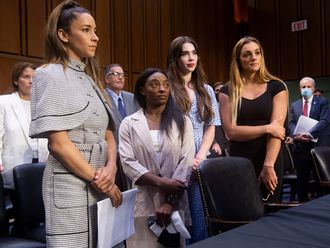WASHINGTON: Senator John McCain announced on Friday that he would oppose the latest proposal to repeal the Affordable Care Act, leaving Republican leaders with little hope of succeeding in their last-ditch attempt to dismantle the health law and fulfil their long-standing promise to conservative voters.
For McCain, it was a slightly less dramatic reprise of his middle-of-the-night thumbs-down that killed the last repeal effort in July. This time, the senator, battling brain cancer and confronting his best friend in the Senate, Lindsey Graham of South Carolina, issued a statement saying that he could not “in good conscience” support the proposal by Senators Graham and Bill Cassidy of Louisiana.
“I believe we could do better working together, Republicans and Democrats, and have not yet really tried,” McCain said. “Nor could I support it without knowing how much it will cost, how it will affect insurance premiums, and how many people will be helped or hurt by it.”
With two other Republican senators likely to vote no, McCain’s opposition to the bill could be fatal. With Democrats united in opposition, Senate Republicans can afford to lose only two of their members.
Senator Rand Paul said this week that he would not vote for the bill because it did not dismantle enough of the Affordable Care Act. And Senator Susan Collins has expressed broad concerns about the legislation, strongly suggesting that she, too, would vote against it — just as she voted no in July along with McCain and a third Republican senator, Lisa Murkowski of Alaska. Collins said on Friday that she was “leaning against” the proposal.
For months, McCain has lamented a Senate legislative process that avoided hearings or formal bill-drafting procedures and excluded Democrats. On Friday, he said those tactics were intolerable.
“We should not be content to pass health care legislation on a party-line basis, as Democrats did when they rammed Obamacare through Congress in 2009,” McCain said. “If we do so, our success could be as short-lived as theirs when the political winds shift, as they regularly do.”
A bill of this magnitude “requires a bipartisan approach,” McCain added.
Those concerns were compounded by the decision of Republican leaders to press forward with a vote next week before the non-partisan Congressional Budget Office can complete a full analysis of the Graham-Cassidy legislation. The budget office is expected to estimate the cost of the bill early in the week, but it indicated that it would not be able to complete an analysis of the bill’s effects on health insurance coverage or premiums by September 30.
That date is critical because Republicans, who hold 52 seats in the Senate, have until the end of this month to make use of special budget rules that would allow them to pass a repeal bill in the Senate with only a simple majority, rather than 60 votes. If Republicans could get 50 votes, Vice-President Mike Pence would break the tie in their favour.
“Of course, I’m disappointed,” Cassidy said in an interview, “but that doesn’t mean that I’m going to stop working for those folks who can’t afford their premiums. We are still working. We are still hoping.”
Graham, mindful of his long-standing relationship with McCain, was gracious. “My friendship with John McCain is not based on how he votes,” Graham said, “but respect for how he’s lived his life and the person he is.”
Pence was not giving up. “President Trump and I are undeterred,” he said at a speech in Indiana.
A spokeswoman for the Senate majority leader, Mitch McConnell of Kentucky, declined to comment on whether he would press forward with a vote.
Democrats have vowed that if the repeal legislation could be killed, they would press to resume bipartisan negotiations on legislation to stabilise health insurance markets under the Affordable Care Act. Republican leaders squelched those talks, led by Senators Lamar Alexander and Patty Murray as they pushed for passage of a full repeal bill.
“John McCain shows the same courage in Congress that he showed when he was a naval aviator,” said Senator Chuck Schumer of New York, the Democratic leader. “I have assured Senator McCain that as soon as repeal is off the table, we Democrats are intent on resuming the bipartisan process.”












